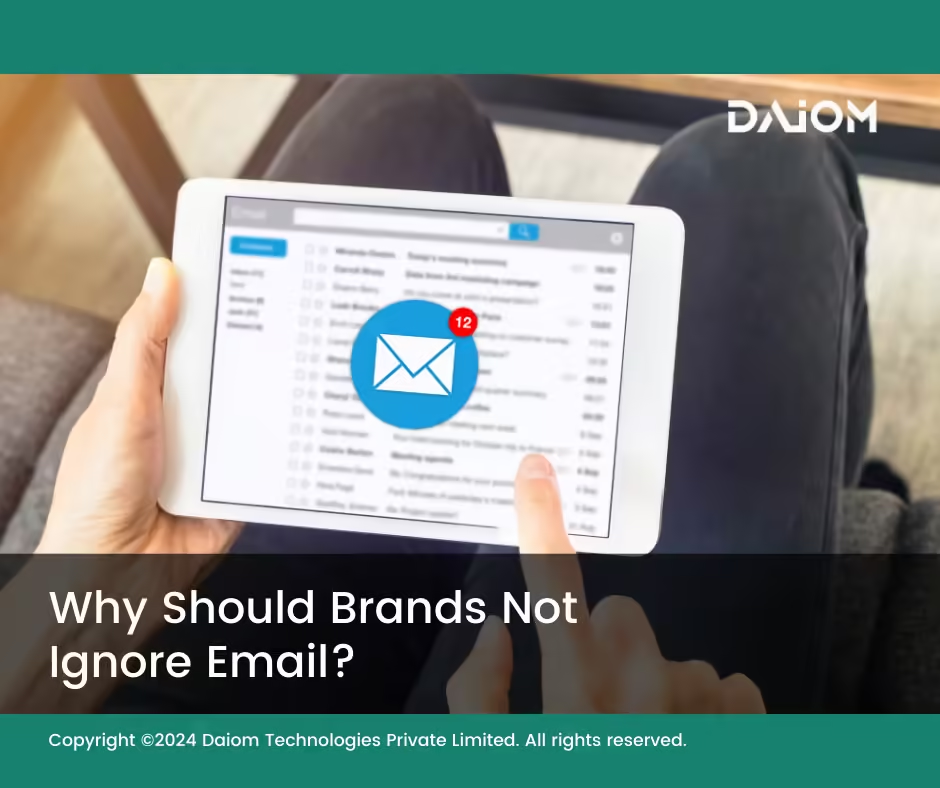When the internet started, having an email address was a universal standard. Today, almost everyone still has at least one email address, making it a global identity.
However, in the past few years, with the rise of platforms like WhatsApp and other messaging apps, many brands shifted their focus away from email marketing. They assumed these newer, faster channels were better for reaching customers.
Yet, this shift came with its challenges. Customers often find direct communication via WhatsApp, SMS, or push notifications too intrusive.
These channels, while immediate, can feel like an invasion of privacy. In contrast, email provides a non-intrusive way to communicate, which is why email marketing is becoming more relevant now than ever before.
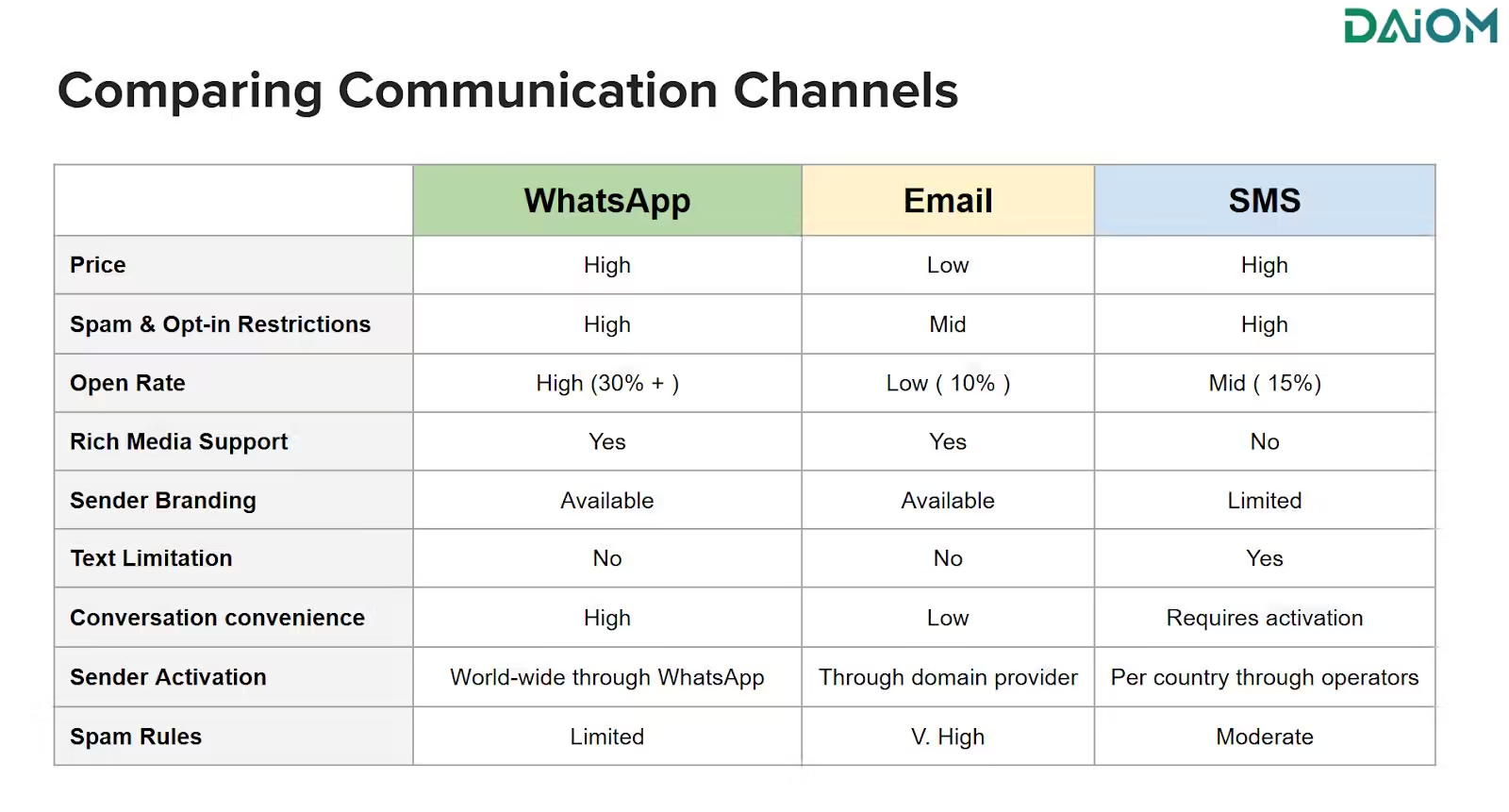
Customers can engage with emails at their convenience without feeling pressured or interrupted. The ability to include rich, long-form content also sets email apart, offering brands a chance to connect deeply with their audience.
Here’s why email marketing is a must:
- Exceptional ROI: Email marketing delivers one of the highest returns in the industry, with an average ROI of $36 for every dollar spent. Its cost-effectiveness allows brands to run consistent campaigns without stretching budgets.
- Better Reach: Unlike WhatsApp or SMS, which often miss 50-60% of their audience due to delivery issues, email ensures broader reach. It’s universally accessible and not dependent on specific platforms or apps.
- Versatility of Content: Emails support long-form content, rich media, and personalized messaging. From detailed product info to engaging storytelling, emails allow brands to connect with their audience meaningfully.
- Cost-Effective Communication: Email campaigns cost a fraction of WhatsApp or SMS campaigns, making them ideal for startups and small businesses. Brands can scale communication effectively without overspending.
Email has an ability many channels don’t: creating valuable, personal touches—at scale.
David Newman
Table of Contents
1. Why Email Marketing is Gaining Momentum Again?
In a world filled with intrusive marketing channels like SMS, WhatsApp, and push notifications, email stands out as a dependable and effective tool.
From delivering an exceptional ROI to supporting versatile content formats, email marketing provides advantages that other channels simply cannot match.
Let’s dive deeper into the key reasons why email should be at the core of your marketing strategy.
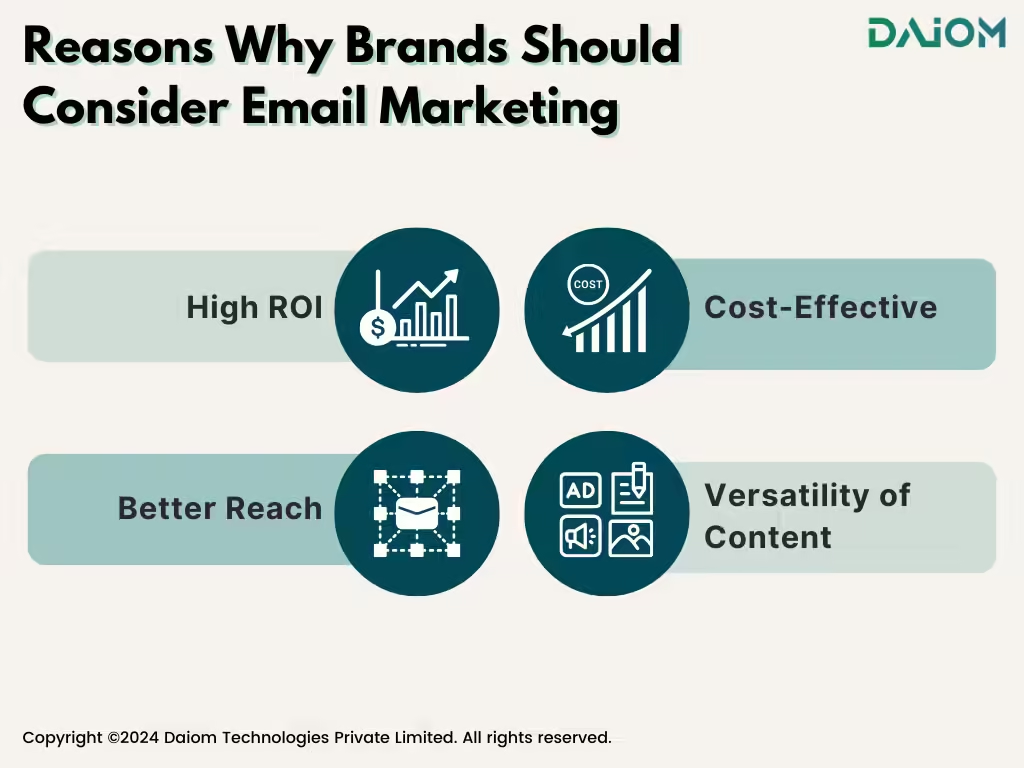
1.1 High ROI
Email marketing is a proven resource when it comes to return on investment (ROI). Studies show that every dollar spent on email marketing can yield an average ROI of $36, making it one of the most lucrative channels for marketers.
The flexibility to send multiple campaigns per week or month without significantly increasing costs allows brands to maintain consistent communication with their customers.
Leading brands like Amazon have built their marketing success on leveraging email. Whether it’s abandoned cart reminders, product recommendations, or exclusive deals, their email campaigns drive high engagement and conversions. For smaller businesses, adopting similar strategies can yield significant results without breaking the bank.

1.2 Better Reach
While channels like SMS and WhatsApp might seem effective, they come with significant limitations. Delivery rates on these platforms are inconsistent, with many messages failing to reach customers due to network issues, app settings, or privacy restrictions.
In fact, it’s estimated that SMS and WhatsApp campaigns miss 50-60% of their intended audience.
In contrast, email has a broader reach, with fewer delivery barriers. Most people actively check their email inboxes, making it a dependable channel for communication.
Moreover, email doesn’t rely on specific apps or platforms—anyone with an email address can receive messages, making it universally accessible.
1.3 Versatility of Content
One of email’s greatest strengths is its ability to accommodate diverse content types. Unlike SMS or WhatsApp, which are typically constrained by character limits or simple text formats, email supports long-form content with rich media, such as images, videos, and links.
This versatility enables brands to share detailed product information, compelling stories, and even personalized recommendations in a single message.
Additionally, emails can be optimized for search engines, enhancing visibility and driving organic traffic. With the ability to include CTAs (calls to action), trackable links, and dynamic content, email becomes more than a marketing tool—it’s a platform for engaging storytelling, building relationships, and encouraging meaningful actions from customers.
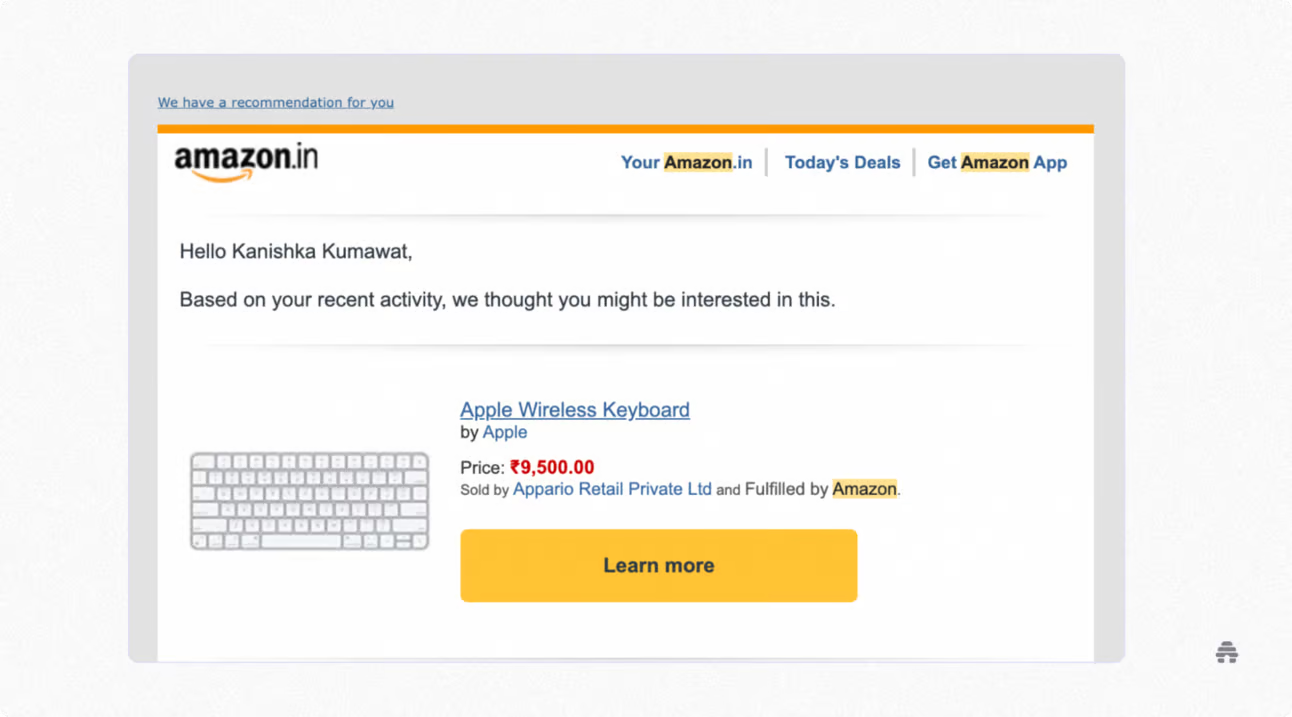
1.4 Cost-Effective Communication
Email marketing stands out as one of the most affordable digital marketing channels, making it an excellent choice for businesses aiming to optimize their budgets.
The cost of sending an email is incredibly low—nearly 1/50th of what it costs to execute a WhatsApp marketing campaign. Unlike WhatsApp or SMS, which often come with per-message charges and higher campaign costs, emails can be sent to large audiences at a minimal price.
For example, a brand can send thousands of emails for the cost of a single SMS campaign, providing an unmatched scale for communication.
This cost-effectiveness is particularly beneficial for startups and small businesses, allowing them to compete with larger players without overspending.
Additionally, email platforms often offer advanced features like automation, personalization, and analytics as part of their basic pricing, adding more value without additional costs.
2. Overcoming Challenges in Retention Marketing with Email Marketing
Brands today face significant hurdles when it comes to keeping customers engaged and ensuring repeat business.
Addressing these challenges requires a shift in marketing strategy and email marketing emerging is the key solution to overcome these challenges:
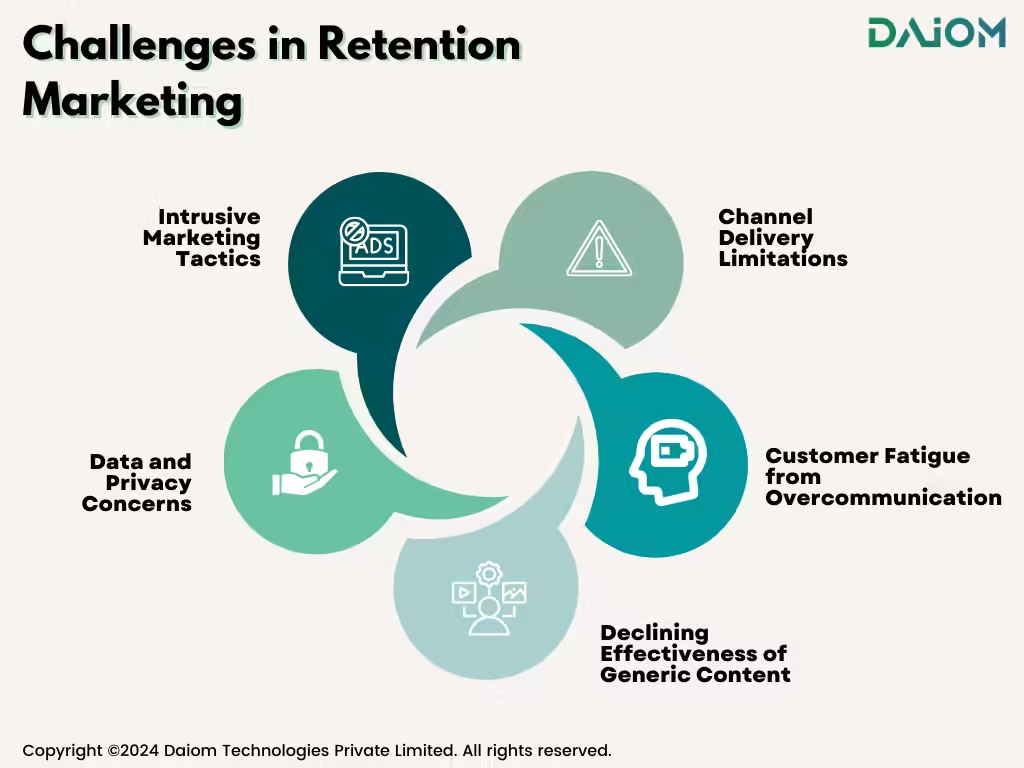
Customer Fatigue from Overcommunication: With channels like WhatsApp, SMS, and push notifications being overused, customers often feel overwhelmed. This can lead to frustration, reduced engagement, and even unsubscribes.
Intrusive Marketing Tactics: Many retention strategies rely on direct and immediate communication, which can feel invasive. Customers are becoming more selective about how and where they want to be contacted, making it harder to strike the right balance.
Data and Privacy Concerns: With stricter regulations and growing concerns about data security, brands must ensure their retention marketing efforts comply with privacy laws. Mishandling customer data can lead to reputational damage and loss of trust.
Channel Delivery Limitations: Platforms like WhatsApp and SMS come with delivery restrictions or technical limitations, resulting in a significant percentage of messages not reaching the intended audience.
Declining Effectiveness of Generic Content: Customers today expect personalized and meaningful communication. Generic messages fail to create an impact, making it challenging for brands to stand out in a competitive landscape.
3. 3 Steps for Brands to Scale Email Marketing
Scaling email marketing requires a clear focus on these three steps: rebuilding the brand database, crafting valuable content, and maintaining a strong domain reputation.
By mastering there 3 areas, brands can unlock email’s full potential as a powerful tool for customer engagement and growth.
3.1 Rebuild Your Email Database
Over time, many brands have lost focus on capturing customer email addresses, often due to a shift in priority toward social media or other channels. However, email remains one of the most effective ways to engage customers directly. To rebuild your email database:
- Capture Emails at Every Touchpoint: Ensure you’re collecting email addresses through online channels, such as website forms, checkout pages, and account sign-ups. Offline opportunities, like in-store purchases or events, should also be utilized by asking customers to provide their email addresses.
- Offer Incentives: Encourage customers to share their email addresses by offering perks like discounts, free resources, or exclusive content.
- Keep Data Updated: Regularly clean your database to remove invalid or inactive email addresses, ensuring your campaigns maintain high deliverability and engagement rates.
By actively focusing on collecting email addresses, brands can create a robust foundation for their email marketing efforts.
3.2 Focus on Valuable Content
The success of email marketing hinges on delivering content that resonates with your audience. Customers are more likely to engage with emails that offer value rather than generic or promotional messages. Here’s how brands can create impactful content:
- Personalize the Experience: Use data to tailor emails to individual preferences. For instance, Amazon sends personalized product recommendations or abandoned cart reminders, encouraging customers to complete their purchases. This approach makes customers feel valued and understood.
- Provide Useful Information: Share content that educates or entertains, such as tips, guides, or industry updates, in addition to promotional offers.
- Segment Your Audience: Divide your email list into smaller groups based on behavior, demographics, or purchase history, allowing you to send more targeted messages that improve engagement rates.
Consistently providing valuable content builds trust and keeps customers looking forward to your emails, making it easier to drive conversions.
3.3 Build Domain Reputation
A strong domain reputation ensures that your emails consistently reach your customers’ inboxes rather than being marked as spam. To achieve this, brands need to adopt the following best practices:
- Maintain Consistency: Send emails regularly to stay top-of-mind with your audience. Sporadic emails can hurt engagement and deliverability.
- Follow Best Practices: Avoid practices like buying email lists, as they can damage your domain reputation. Instead, focus on building an organic list of subscribers who genuinely want to hear from you.
- Ensure Relevance: Deliver emails that align with your audience’s interests and preferences. Irrelevant content can lead to unsubscribes or complaints, affecting your domain reputation.
Unlike other channels, email marketing is unaffected by price fluctuations or delivery issues, making it a stable and dependable long-term option. By investing in domain reputation, brands can ensure their email marketing efforts are effective and sustainable.
Every email is a customer survey of your target market, by testing they vote on what resonates best with them.
Kath Pay
4. Conclusion
Email marketing isn’t just surviving; it’s thriving. Brands like Amazon have shown how powerful this channel can be when done right. By focusing on rebuilding databases, creating engaging content, and ensuring strong domain reputation, brands can unlock the full potential of email marketing.
If you haven’t yet explored or scaled your email marketing efforts, now is the time to start. Email is here to stay, offering a cost-effective, reliable, and customer-friendly way to grow your business.
If you’d like to discuss how we can help enhance and optimise your Omnichannel, Retention and growth marketing strategies, we’d be happy to set up a consultation call. Feel free to reach out to us at alibha@daiom.in
For more informative content and blog, follow and stay tuned to DAiOM.
Subscribe to our NEWSLETTER!


